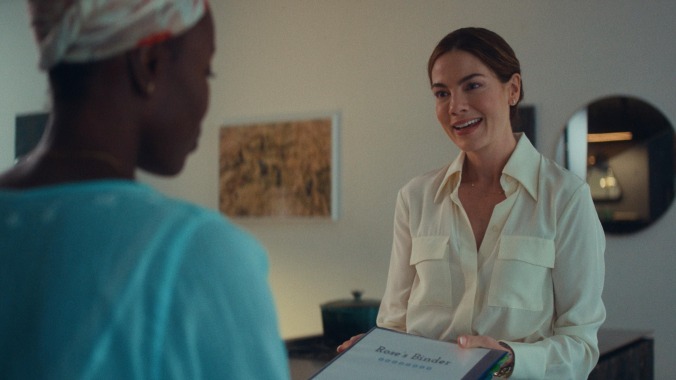Nanny is a last-minute contender for best horror film of the year
Nikyatu Jusu weaves West African folklore and domestic horror into a chilling tapestry in Nanny, which also features an exceptional performance from Anna Diop

There’s something about the experience of domestic work that goes hand-in-hand with good horror storytelling. Henry James knew it, John Carpenter knows it, and Nikyatu Jusu knows it too. The title character in Jusu’s feature directorial debut, Nanny (in theaters November 23 and streaming on Prime Video December 16), is a haunted figure who exists for much of the film in an alien space, a cold home that’s not her own. There’s a sense of roaming through a haunted house, but also a sense that a nanny can herself be a kind of ghost, wandering through space that she doesn’t own, sometimes unseen, sometimes barely there. It’s a potent place from which to begin a horror film, but Nanny doesn’t stop there.
What begins as an uncomfortable introduction into a strange new environment soon changes shape, and Nanny rises to become an unsettling, darkly gorgeous meditation on the immigrant experience, West African folklore, and the forces which drive one woman to keep fighting. With those elements in place, all anchored by a fearless performance from Anna Diop, it emerges as one of the most compelling horror films of the year.
Diop is Aisha, an immigrant from Senegal who’s settled in New York City, where she hopes to earn enough money to fly her young son over from their home country to start a new life. It’s this pursuit that leads her to the doorstep of Amy (Michelle Monaghan), who needs a nanny for her daughter Rose (Rose Decker). It’s a good job in a nice house, and Aisha’s spirits are bolstered by a new relationship with a local guy (Sinqua Walls) who takes a liking to her.
But the path to the life Aisha wants isn’t so easily traversed. As the new job takes a larger and larger role in her life, and her relationship with Amy becomes more and more strained, Aisha forms both a deeper bond with Rose and a new sense of anxiety informed by startlingly realistic nightmares. Something has taken root in Aisha’s mind, something informed by her homeland that may want to help her or may want to hurt her, and it changes everything about her life, her work, and quite possibly, her future.
How exactly this all unfolds is better left for the film itself to lay out, but the way Jusu structures her story makes for an elegant, satisfyingly creepy slow-burn fusion of folk horror and domestic chiller. Right away, there’s an intimacy within the subject matter, a sense that Jusu and Diop know every nook and cranny of this experience, that makes Nanny both immersive and almost instantly unsettling, even in the quiet moments when everything seems to be going well. Jusu’s script—which never overstays its welcome at a tight, horror-friendly 98 minutes—is packed with rich details that lay out all the little fears that come with a job like this one, all of them true, all of them frightening. What if Amy’s husband (Morgan Spector) gets a little too familiar? What if something happens back home that Aisha can’t handle? What if Rose starts to overshadow her own son’s place in her life? What if, in the eyes of her employer, Aisha becomes less of a helper and more of an enemy?
Jusu and cinematographer Rina Yang emphasize these questions, and the dread they bring, through a series of subtle but invigorating contrasts. Outside of Amy’s home, Aisha’s world seems to have more color. She can feel the warmth of the neon, the brightness of her potential future, the passion that’s forming in her love life. Inside the home, things are cooled down, even washed out, emphasizing the remove of it all. With the exception of Rose, everything in her work life seems boxy and artificial, and the more she brings her own warmth into that world, the higher the tension rises with Amy. It’s a movie that plays with light and shadow wonderfully, and that sense of contrast is echoed in the sound design. Water plays an important part in the film, as do the often intrusive sounds of New York City itself, and Jusu and her team weave those elements through each scene in ways that creep up on you, until it’s too late. It’s all designed to make you ask yet another question of the film: Are Aisha’s nightmares just nightmares, or is something else going on?
It’s that question, and the velvety, gradual horror that comes with it, which centers Nanny as a horror film, and which allows it to stand out as a singular story that’s nevertheless rooted in very relatable fears. It’s not a film that seeks to freak you out with jump scare after jump scare, but rather a film that wants to burrow down into your heart and fester, seeping into your room like a slow trickle of water. At times it seems like this sense of the gradual might start to veer into aimless meandering, but every time that happens, Jusu—and Diop’s astonishing, vulnerable lead performance—brings things right back to center, cementing Nanny as one of the best-crafted horror films of 2022.